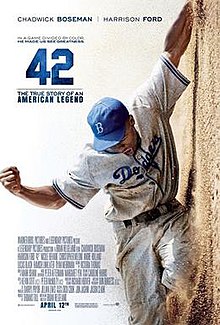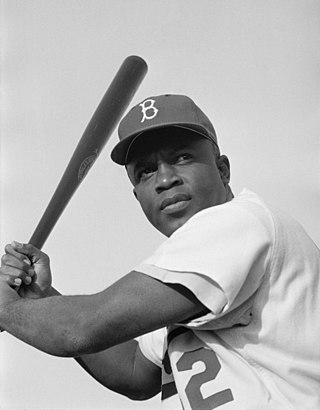
Jack Roosevelt Robinson was an American professional baseball player who became the first African American to play in Major League Baseball (MLB) in the modern era. Robinson broke the color line when he started at first base for the Brooklyn Dodgers on April 15, 1947. The Dodgers signing Robinson heralded the end of racial segregation in professional baseball that had relegated black players to the Negro leagues since the 1880s. Robinson was inducted into the Baseball Hall of Fame in 1962.

The Los Angeles Dodgers are an American professional baseball team based in Los Angeles. The Dodgers compete in Major League Baseball (MLB) as a member club of the National League (NL) West Division. Established in 1883 in Brooklyn, New York, the team joined the NL in 1890 as the Brooklyn Bridegrooms and assumed several other monikers before finally settling on the name Dodgers in 1932. From the 1940s through the mid-1950s, the Dodgers developed a fierce crosstown rivalry with the New York Yankees as the two clubs faced each other in the World Series seven times, with the Dodgers losing the first five matchups before defeating them to win the franchise's first title in 1955. It was also during this period that the Dodgers made history by breaking the baseball color line in 1947 with the debut of Jackie Robinson, the first African American to play in the Major Leagues since 1884. Another major milestone was reached in 1956 when Don Newcombe became the first player ever to win both the Cy Young Award and the NL MVP in the same season.
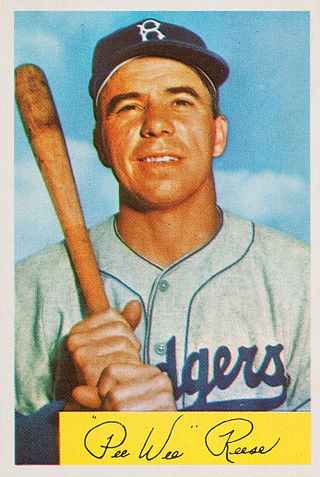
Harold Peter Henry "Pee Wee" Reese was an American professional baseball player and coach. He played in Major League Baseball as a shortstop for the Brooklyn / Los Angeles Dodgers from 1940 to 1958. A ten-time All-Star, Reese contributed to seven National League championships for the Dodgers and was inducted into the Baseball Hall of Fame in 1984. Reese is also famous for his support of his teammate Jackie Robinson, the first black player in the major leagues' modern era, especially in Robinson's difficult first years, most notably when he put his arm around Robinson during a pre-game warmup in front of a heckling crowd.

Wesley Branch Rickey was an American baseball player and sports executive. Rickey was instrumental in breaking Major League Baseball's color barrier by signing black player Jackie Robinson. He also created the framework for the modern minor league farm system, encouraged the Major Leagues to add new teams through his involvement in the proposed Continental League, and introduced the batting helmet. He was posthumously elected to the Baseball Hall of Fame in 1967.
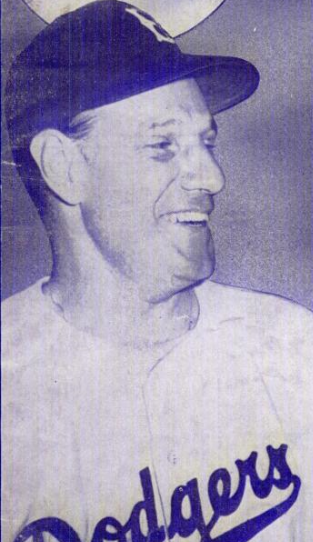
Leo Ernest Durocher, nicknamed "Leo the Lip" and "Lippy", was an American professional baseball player, manager and coach. He played in Major League Baseball as an infielder. Upon his retirement, he ranked fifth all-time among managers with 2,008 career victories, second only to John McGraw in National League history. Durocher still ranks twelfth in career wins by a manager. A controversial and outspoken character, Durocher's half-century in baseball was dogged by clashes with authority, the baseball commissioner, the press, and umpires; his 95 career ejections as a manager trailed only McGraw when he retired, and still ranks fourth on the all-time list. He won three National League pennants and one world championship.

Edward Raymond Stanky (born Stankiewicz was an American professional baseball second baseman, shortstop, and manager. He played in Major League Baseball for the Chicago Cubs, Brooklyn Dodgers, Boston Braves, New York Giants, and St. Louis Cardinals between 1943 and 1953. He was born in Philadelphia, Pennsylvania.

Walter Francis O'Malley was an American sports executive who owned the Brooklyn / Los Angeles Dodgers team in Major League Baseball from 1950 to 1979. In 1958, as owner of the Dodgers, he brought major league baseball to the West Coast, moving the Dodgers from Brooklyn to Los Angeles despite the Dodgers being the second most profitable team in baseball from 1946 to 1956, and coordinating the move of the New York Giants to San Francisco at a time when there were no teams west of Kansas City, Missouri. In 2008, O'Malley was elected to the National Baseball Hall of Fame for his contributions to and influence on the game of baseball.

Fred E. "Dixie" Walker was an American professional baseball player, coach, scout and minor league manager. He played as a right fielder in Major League Baseball from 1931 to 1949. Although Walker was a five-time All-Star selection, and won a National League batting championship (1944) as well as an RBI championship (1945) as a member of the Brooklyn Dodgers, his accomplishments as a player were overshadowed by his attempt to keep Jackie Robinson from joining the Dodgers in 1947. He also played for the New York Yankees, Chicago White Sox, Detroit Tigers and Pittsburgh Pirates.

Clyde Leroy Sukeforth, nicknamed "Sukey", was an American baseball catcher, coach, scout and manager. He was best known for scouting and signing Jackie Robinson, the first black player in the modern era of Major League Baseball (MLB), to the Brooklyn Dodgers, after Robinson was scouted by Tom Greenwade in the Negro leagues. He was also instrumental in scouting and acquiring Roberto Clemente for the Pittsburgh Pirates.

Burton Edwin Shotton was an American player, manager, coach and scout in Major League Baseball. As manager of the Brooklyn Dodgers, he won two National League pennants and served as Jackie Robinson's first permanent Major League manager.

Robert Randall Bragan was an American shortstop, catcher, manager, and coach in Major League Baseball and an influential minor league executive. His professional baseball career encompassed 73 years, from his first season as a player in the Class D Alabama–Florida League in 1937, to 2009, the last full year of his life, when he was still listed as a consultant to the Texas Rangers' organization.

The Jackie Robinson Story is a 1950 biographical film directed by Alfred E. Green and starring Jackie Robinson as himself. The film focuses on Robinson's struggle with the abuse of bigots as he becomes the first African-American Major League Baseball player of the modern era. The film is in part based on Robinson's own autobiography, My Own Story.

Walter Kirby Higbe was an American right-handed starting pitcher in Major League Baseball (MLB) from 1937 to 1950. Best known for his time with the Brooklyn Dodgers, he was a two-time National League (NL) All-Star.

Frederick Raymond "Fritz" Ostermueller was an American left-handed pitcher in Major League Baseball from 1934 to 1948, playing for the Boston Red Sox, St. Louis Browns, Brooklyn Dodgers, and Pittsburgh Pirates. While with Pittsburgh, he coined a quote frequently misattributed to teammate Ralph Kiner: "Home run hitters drive Cadillacs; singles hitters drive Fords."
Brooklyn Dodgers: Ghosts of Flatbush is a 2007 documentary film produced by HBO Sports chronicling the last ten years of the Brooklyn Dodgers' tenure in the borough of churches. The film documents how in 1947 Jackie Robinson broke the baseball racial barrier in previously segregated major league, the struggles to win what seemed an unreachable World Series title in 1955, and the issues and community feelings involved in the team's sudden departure to Los Angeles after the 1957 campaign.
On April 15, Jackie Robinson was the opening day first baseman for the Brooklyn Dodgers, becoming the first black player in Major League Baseball. Robinson went on to bat .297, score 125 runs, steal 29 bases and win Major League Baseball's inaugural Rookie of the Year award. The Dodgers won the National League title and went on to lose to the New York Yankees in the World Series. This season was dramatized in the movie 42.
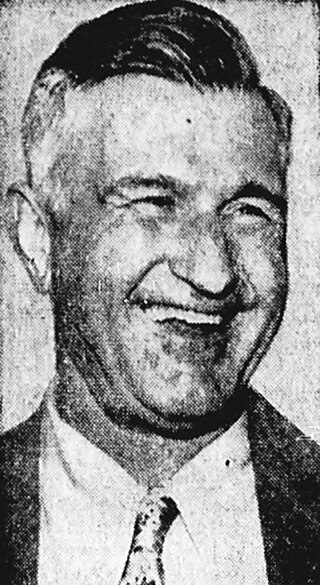
Robert Clay Hopper was an American professional baseball player and manager in minor league baseball. Hopper played from 1926 through 1941 and continued managing through 1956.

Jackie Robinson Day is a traditional event which occurs annually on April 15 in Major League Baseball (MLB), commemorating and honoring the day Jackie Robinson made his major league debut. Celebrated at MLB ballparks, on that one day, all players, coaches, and managers on both teams, and the umpires, wear Robinson's uniform number, 42. April 15 was Opening Day in 1947, Robinson's first season in the major leagues.

Chadwick Aaron Boseman was an American actor. During his two-decade career, Boseman received several accolades, including two Screen Actors Guild Awards, a Golden Globe Award, and a Primetime Emmy Award, along with an Academy Award nomination.
The St. Louis Cardinals, a professional baseball franchise based in St. Louis, Missouri, compete in the National League (NL) of Major League Baseball (MLB). After decades of early futility in the National League, St. Louis baseball encountered a renaissance with 11 World Series titles and 18 National League pennants since 1926. Sam Breadon's purchase of the majority stake in the club in 1920 spurred this revival; he then assumed the role as team president and assigned the young, enterprising Branch Rickey as his business manager, functioning as a prototype of today's general manager. In his tenure as owner until 1947, Breadon's Cardinals won nine NL pennants and six World Series titles. During this era in Cardinals franchise history, they also totaled 2,898 wins and 2,171 losses in the regular season for a .572 winning percentage.
